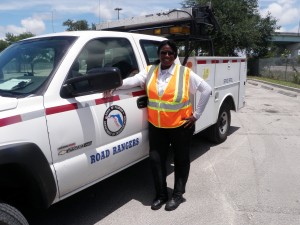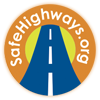Headlights On . . . Wanda Williams
Company: Sunshine Towing contracted to Florida Department of Transportation
Position/Title: Road Ranger
Patrol Location: I-95, I-595 and I-75 in Broward County, Florida
How did you become a Road Ranger? What previous positions have you held? How long have you been a patrol operator?
I’ve been with the Road Rangers for five years. I joined the team after seeing an ad for drivers in the newspaper and interviewing for the job. Before becoming a Road Ranger, I was driving tractor trailers. I took a year off in between the two jobs to spend with family.
Why did you pursue a position as a Road Ranger?
When I saw the job posting in the paper, the fact that the work was for the Department of Transportation really stood out to me. I spent a lot of time on the road as a driver, so the working conditions were the least of my worries.
What kind of training did you undergo for this position?
I had to complete a full week of working with a trainer. They covered all of the bases from how to safely change tires on the road, dealing with the most frequent auto repairs, and dealing with motorists. After that week, I started out on my own. FDOT also provides an annual training session that Road Rangers and Transportation Management Center operators take together.
In your opinion, what are the most important qualities and skills a Road Ranger should possess?
Any Road Ranger needs to have strength and endurance – both physical and mental. But as a woman working in a man’s world, there’s a third quality: confidence. My confidence has to be my attire every day that I am out there.
You are the only female Road Ranger in Florida, why do you think this position is predominately held by males?
Men have the stereotype of being mechanically inclined, strong, and able to handle stressful situations. Motorists seem to expect this stereotype, too, as it’s not uncommon for them to doubt my opinion on a situation just because I am female. There’s no room to by shy or prissy out there. But just because I’m willing to get my hands dirty out there doesn’t mean I don’t like to get my hair and nails done. I have to hang with the guys, but I don’t have to look like them.
What challenges do you face as a patrol operator, and are there any additional challenges being a female driver?
The biggest challenge is always staying safe, but specifically as a female, it’s showing that you have just as much authority as the men. People think that they can get away with more just because I’m a woman. For instance, after a hurricane a few years ago, there was a man that attempted to take gas supplies off my truck without any hesitation. This probably wouldn’t have happened to one of the guys.
What do you like best about your job?
I think it’s great that every day I go to work and deal with something different and interesting. I get excited when I have the opportunity to clear big accidents. It really keeps me on my toes and challenges me to think of the best ways to clear the road as quick as possible.
What is the hardest part about your job?
They are a lot of hard aspects about being a Road Ranger, but I accept them as part of the job. If I had to pick out one thing that was especially tough for me to deal with, it’s fatal accidents where children are involved. I have three kids of my own, so it really hits home.
What are motorists’ general reaction to your presence on a scene? Any particularly noteworthy stories?
People are just as surprised to see a woman hop out of a truck as they were five years ago when I started!
What was your most significant assist?
One assist will always stay with me is a night time fatality…I was rushing to get to the scene because the road had to be closed and we needed to get MOT (maintenance of traffic) set up. I arrived and hurried to start setting up cones. I had just gone back to my truck to get more cones when a Trooper pulled me back by my vest. In the split second I had turned around, a drunk driver had lost control and was headed right toward me. Thanks to the Trooper, I was out of the way. The drunk driver hit my truck right where I had been standing.
What’s one rule of thumb you think all motorists could benefit from following?
There are so many things to choose from, but one thing a motorist should know after being helped is to accelerate on the shoulder and then merge. Many people jump right back on the highway before picking up enough speed. This causes oncoming traffic to slam on the brakes or swerve, both of which could cause an accident.
What’s one rule of thumb you think all patrol drivers could benefit from following?
Be defensive while you are driving and be alert when helping motorists. When you are in a hurry to get to a call, you still have to be aware of the motorists around you. Don’t get in an accident on the way to help someone out! It’s also important to be on guard while you are helping people. Not everyone is happy to see a Road Ranger pull up behind them.
What would you like other states to know about the Road Rangers?
The Road Rangers open Florida’s highway safely and quickly, but also offer travelers directions, if needed.
What would you like to know about other state’s safety service patrols?
It would be great to hear more about other states’ patrols and how they compare and contrast to ours. Every state has its own challenges and we could really learn from each other.
Additional Comments:
Road Rangers don’t just help with car issues. We are also social workers and doctors. Many times a Road Ranger is the first to respond. We need to be ready to deal with ANYTHING while waiting for other agencies to arrive.
